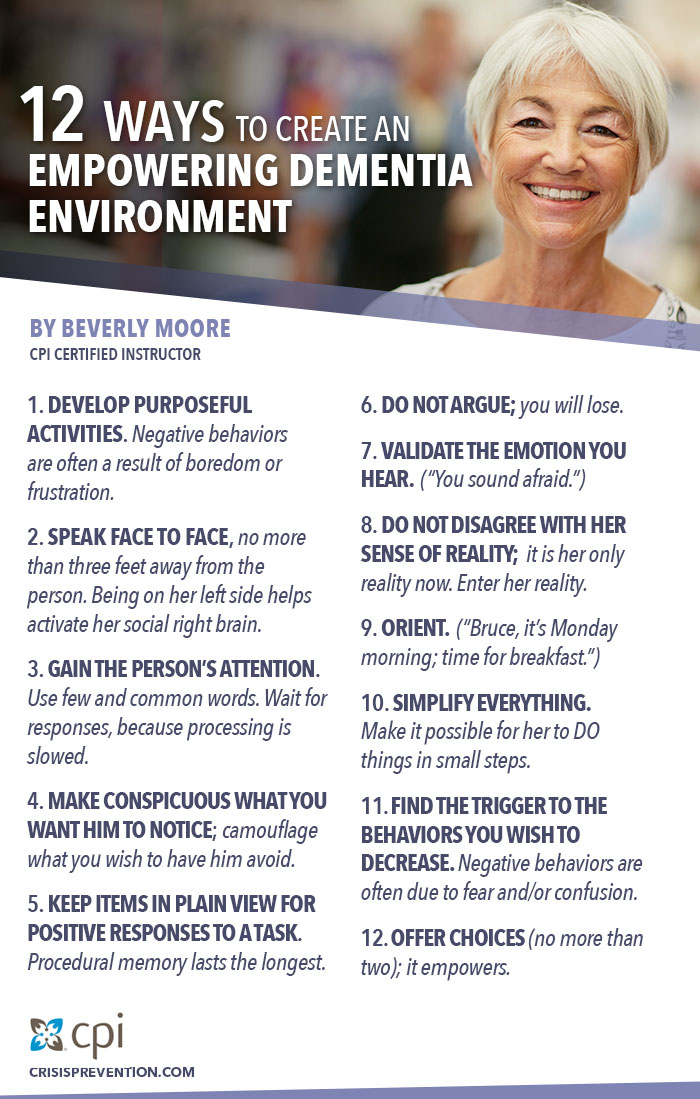
Dementia can be difficult to cope with, but there are ways to improve communication and create more positive experiences.
By Melinda Moore, Wesley Health & Home Care Executive Director
How can we find ways to communicate more effectively with people who have dementia? It can be difficult to understand how dementia affects people, but there are some concepts that can help strengthen our connection with them and create more positive interactions.
Avoid distracting environments: Dementia can make everyday tasks or situations much more difficult. Along with other impairments, everyday noises can be confusing, distracting or overwhelming. Try to hold conversations away from TVs, other conversations and foot traffic.

Don’t rush the conversation: Before sitting down and beginning a conversation, make sure you’ve set aside enough time so that you don’t make them feel hurried or pressured.
Be visible and relaxed: After getting rid of distractions, get their full attention before you start conversing with your friend or loved one. Try to sit at eye level with them rather than standing over them. Standing over or too close to someone is more likely to intimidate or irritate them. Our body language should convey relaxation as this will put them more at ease and help them be more open to having a positive interaction.
Speak clearly and calmly: Make sure they can hear clearly. Speak more slowly, if necessary, allowing pauses in between.
Show them they’re respected and valued: Whether someone has dementia or not, everyone wants to feel respected. Avoid talking about them as if they’re not there or as if they are children. When talking with others, try to include the person with dementia in some way. This will make them feel valued instead of isolated or excluded. Asking their opinion or giving them a choice can also let them know they are respected as a free thinking adult.
Listen patiently: While this might be uncomfortable for some, allowing the person time to process what you’re saying and to respond to it can be greatly beneficial.
 Keep it simple and direct: Avoid asking open-ended or complex questions that may be difficult for them to process or answer. Keep your questions simple and direct and then pause for their response. Again, giving them choices is great so long as there aren’t too many options that can overwhelm them. For example, instead of asking them what they would like to do, try asking if they would like to go for a nice walk.
Keep it simple and direct: Avoid asking open-ended or complex questions that may be difficult for them to process or answer. Keep your questions simple and direct and then pause for their response. Again, giving them choices is great so long as there aren’t too many options that can overwhelm them. For example, instead of asking them what they would like to do, try asking if they would like to go for a nice walk.
If they don’t seem to understand, try breaking it down into simpler context. Remember that having dementia doesn’t necessarily mean they’re hard of hearing; it means that they are dealing with confusion. Instead of repeating something they don’t understand, try rephrasing it in a way they might be able to understand better.
Validate their feelings instead of arguing: Arguments can be unpleasant and can turn an otherwise positive interaction into an upsetting experience for everyone. Avoid getting into arguments or trying to correct them when they get something wrong. Instead, validate their feelings by trying to accept the way they feel or look at a situation.
Be patient and accepting: Practice patience and understand that there will be good days, bad days and better times of day, usually in the morning. If they are feeling sad, allow them to express why without dismissing their feelings. Sometimes, people just need to feel heard.
Overall, we can greatly improve our experiences with people with dementia by making them feel valued and respected, by practicing patience and by listening with intent to understand.